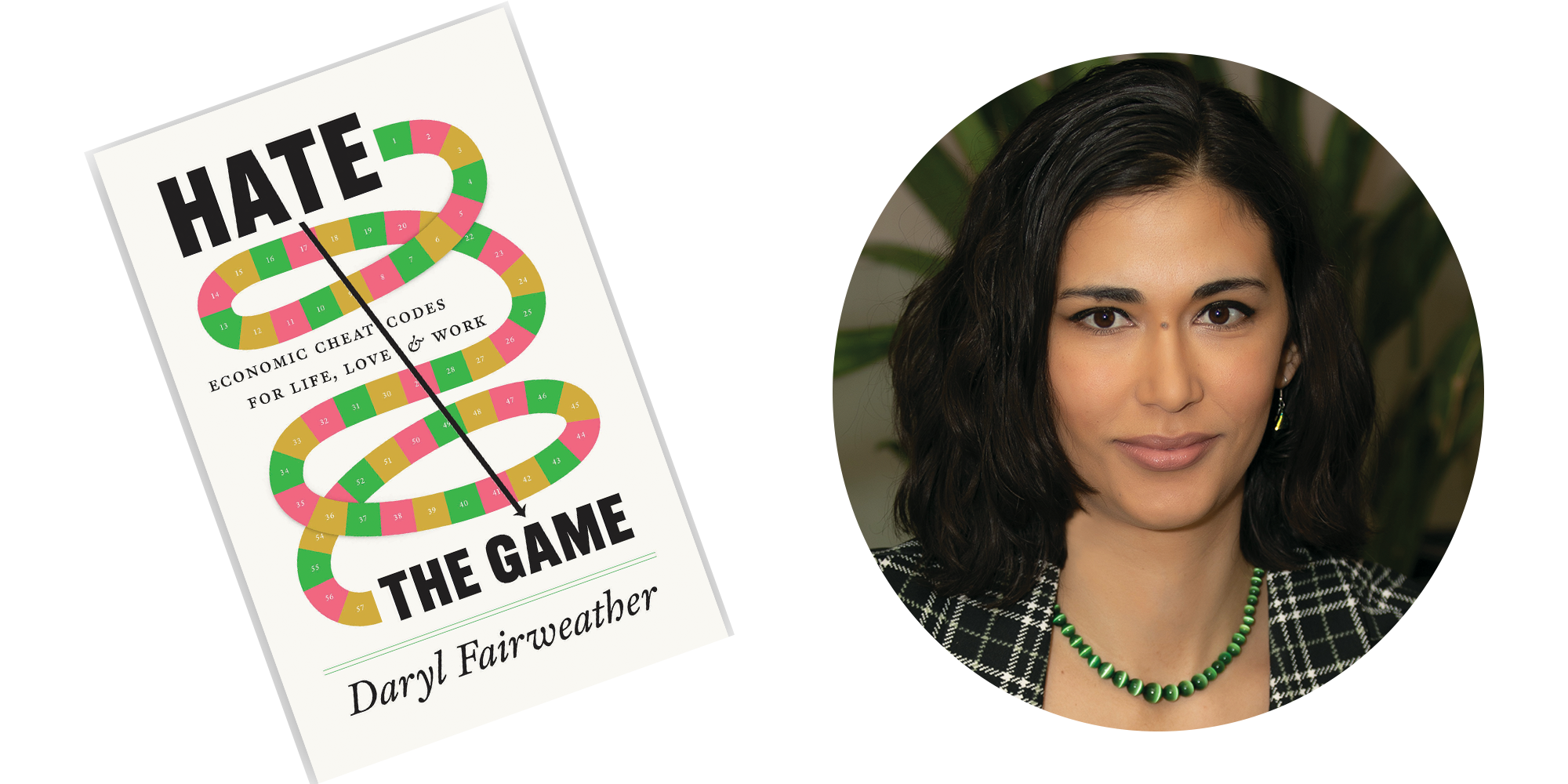
Hate the Game brings together game theory concepts, pop culture references, and Daryl Fairweather’s (AM’12, PhD’14) personal experiences. (Portrait photo courtesy Daryl Fairweather, AM’12, PhD’14)
Daryl Fairweather’s (AM’12, PhD’14) new book encourages readers to think like an economist.
In 1999 two members of the band Destiny’s Child, fresh off their first number one hit, issued an ultimatum. Either Mathew Knowles—the group’s manager and the father of the third member, Beyoncé—had to go, or they would.
The gambit failed. LaTavia Roberson and LeToya Luckett were dismissed and replaced. The reconstituted Destiny’s Child went on to release smash after smash, and Beyoncé became, well, Beyoncé.
To economist Daryl Fairweather, AM’12, PhD’14, this story is not merely an interesting footnote in pop music history. It also illustrates the peril of overestimating your power in a negotiation: Knowles recognized, in a way that Roberson and Luckett did not, that his daughter was the breakout star of Destiny’s Child. They needed the band more than the band needed them.
As Fairweather writes in her new book Hate the Game: Economic Cheat Codes for Life, Love, and Work (University of Chicago Press, 2025), many workers—including, once, her—make the same mistake as Roberson and Luckett. They ask for raises or threaten to quit, believing themselves to be significantly less replaceable than they really are. But knowledge of key concepts in economics, Fairweather believes, can help people avoid those kinds of strategic blunders in work and life. Her book, studded with personal stories and pop culture references, offers just such a primer.
Hate the Game emphasizes game theory, a branch of economics and mathematics that focuses on decision-making in competitive situations, when each player’s outcome depends on the behavior of others. Fairweather’s goal, she explains, was to use her own experiences less as examples to follow and more as “a vessel for all of the economics that I wanted to teach someone that I thought would be useful to them in their careers.”
And the book’s (frequent) Beyoncé references? “If you notice that almost every time I bring up pop culture, it’s about a Black woman, that was deliberate, because I’ve never seen an economics book center Black women,” Fairweather says. She wanted to use metaphors that she knew would resonate with “younger women and women of color, and I wanted them to feel like this book was for them.”
Fairweather never seriously doubted that economics was for her, but others did. When she began her undergraduate studies at MIT, her family encouraged her to major in engineering or another hard science—in these more objective fields, they argued, she would be less likely to face discrimination. In graduate school, she was one of eight women in a cohort of 39, and the only Black woman; she often felt the weight of being a double minority.
Though she originally planned to become a professor, Fairweather left academia for industry and went on to serve as a behavioral economist at Amazon. Today she is chief economist at the real estate company Redfin.
Hate the Game differs from other career advice books in its explicit acknowledgment that much about our economic system isn’t fair. “How could our economy possibly be meritocratic when white Americans are 28 times more likely to become millionaires than Black Americans?” Fairweather writes. Still, she goes on, “the rules of the economy are unfair, but that doesn’t mean you can’t win.”
To that end, the book offers economics-rooted lessons on topics including career decisions, personal finance, and marriage. A frequent theme is the consideration of inside and outside options—in essence, weighing the costs of staying or going. (Roberson and Luckett arguably made the mistake of undervaluing their inside option: staying in Destiny’s Child as glorified backup singers.) Before you leave a job or a relationship, Fairweather advises, you need to feel absolutely certain you prefer your outside options.
She also devotes a meaty chapter to the topic she has spent nearly seven years studying: housing. Working at Redfin has given Fairweather an intimate understanding of the ebbs and flows of the real estate market, as well as its structural challenges. In her day-to-day work, she and her team are using the rich data available to them to answer questions about how the housing market works and how buyers and sellers can navigate it.
In 2020, for instance, Redfin began displaying information about homes’ flood risks. Fairweather partnered with researchers from the University of Southern California, the National Bureau of Economic Research, and MIT to study whether this information affected homebuyers’ decisions. It did, they learned—buyers began favoring less risk-prone homes. Today, in addition to flooding, Redfin displays information about current and future risks of fire, extreme heat, severe wind, and poor air quality.
Of course, decisions about just how much flood risk you’re willing to tolerate—like those about changing jobs or marriage and family life—are specific and contextual. What makes sense for one person could be entirely unsuitable for another. “I don’t know necessarily what people’s trade-offs are, what people’s goals are,” Fairweather says. That’s why she tried to fill her book with frameworks for thinking about hard choices, rather than one-size-fits-all advice. “Hopefully, after reading this book, people can go apply these lessons in a way that makes sense for them.”
